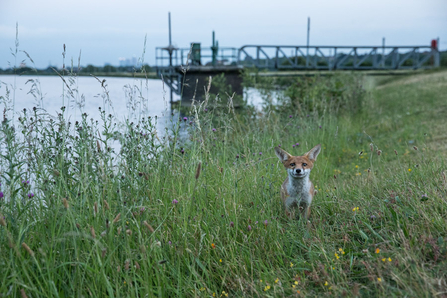
Fox at Walthamstow Wetlands credit Penny Dixie
Great Willowherb at Walthamstow Wetlands credit Mathew Frith

Fox at Walthamstow Wetlands credit Penny Dixie
Groundwater extraction seems like a solution in cities like London with aquifers underneath, but as we’ve seen in cases like Mexico city this has destabilised the ground and the weight of the city is causing it to sink in on itself.
Many freshwater supplies are contaminated by pollutants, particularly from agriculture and industry. Although desalination seems like an obvious option on a planet that is primarily comprised of saltwater, the process is very expensive and is also attributed to releasing chemicals into the water, using vast amounts of energy and threatening fisheries and marine environments, making it relatively unsustainable.
While we are over extracting and depleting our water resources globally we are simultaneously threatening our reserves of freshwater as the icecaps melt into the seawater. This is problematic for a few reasons: The smaller surface area of ice reduces the amount of sunlight reflected at the poles and in return accelerates heating and the release of stores of greenhouse gases as the ice melts. The less well-known issue caused by the rapid melting is that as the less dense fresh water mixes with the salty water the cycle of ocean cooling that starts at the equator is disrupted and deep water circulation currents, referred to as ‘the Global Ocean Conveyor’ become inhibited.
Walthamstow Wetlands reservoir island credit Iain Green
The issue of maintaining water security is actually more complex than it may seem and the protection of our water sources is more vital than ever as in the UK, with high water consumption rates we are expected to reach severe shortages, running short on supply in the next 20-25 years. In London, the Thames and the Lee provide 90% of our water while 30% is supplied through Walthamstow Wetlands. The site is also a site of special scientific interest, providing habitats and species networks, vital for biodiversity, with overwintering and migratory populations of birds, snakes, bats amphibians damselflies and dragonflies. In fact, 40% of all species rely on freshwater wetlands. They also serve purposes for flood protection by storing rainfall and can bring down air temperature by up to 10 degrees Celsius. While they are great carbon sinks with strong ecosystems they can also remove up to 60% of metals and 90% of nitrogen from our drinking water supply.
Threats to wetlands and other freshwater environments include primarily pollution, unsustainable development and climate change. With the UK expected to fall short of our water demands severely by 2050, it’s time to reassess the importance of these habitats and find sustainable ways to manage our water systems and rethink our consuming. If we opt for less water-intensive options in our day-to-day lives it can have a huge impact, like shifting towards plant-based diets (1kg of beef uses 15,500 litres compared with 180 litres for 1kg tomatoes or 250 litres for 1kg potatoes). An environmental shift in our lifestyles needs to include being more conscious of our water consumption to protect the valuable habitats and resources they provide.